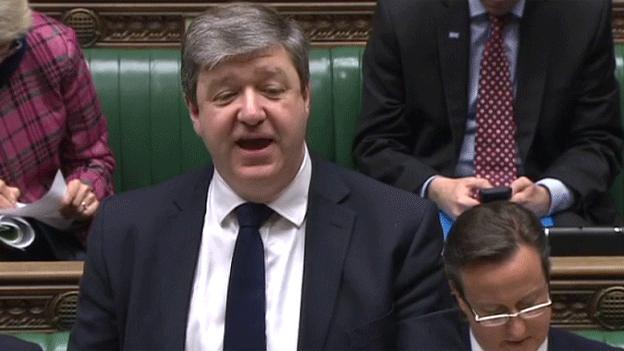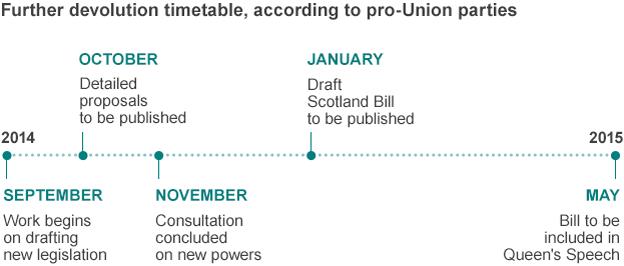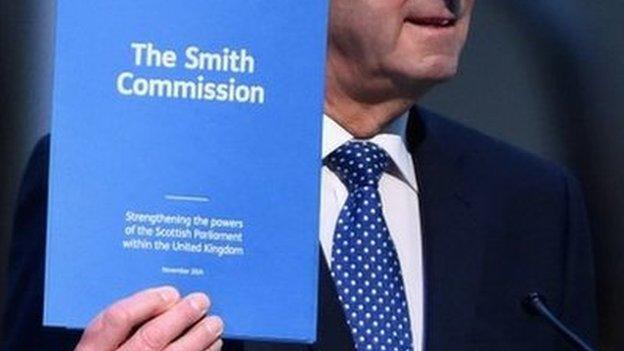Householders to receive leaflet explaining new Scottish powers
- Published

Alistair Carmichael announced the public information campaign to MPs
Every household in Scotland will receive a leaflet explaining what new powers might be handed to Holyrood.
Secretary of State for Scotland Alistair Carmichael told the House of Commons that the leaflet would be part of a public information campaign.
Legislation on new powers was published in January but it will not be made law until after May's general election.
The SNP said spending £1.5m of taxpayers' money on a "phoney public relations offensive" was a "disgrace".
The plan for more Scottish devolution followed the "No" vote at last year's independence referendum.
The day after the poll, Prime Minister David Cameron appointed Lord Smith of Kelvin to head up the cross-party Smith Commission to look at more devolution.
It reported in November, external and a 134-page command paper, external containing draft legislation was then published.

Mr Carmichael told MPs: "The Scotland Office is holding a series of events across Scotland to enable stakeholders to provide feedback on the draft clauses and how the new powers might be used.
"The government will now begin a public information campaign to enable people in Scotland to learn more about the devolution settlement and how it is changing.
"This campaign will use social media, local media and an information book for every household in Scotland."
But SNP MP Angus Robertson said the campaign was "blatant electioneering by the Tories and other 'No' campaign parties to try and stop the SNP".
'Key issue'
He added: "The Smith Commission's recommendations were already underwhelming and were then watered down further by the UK government's command draft paper meaning Scotland will still be without the sufficient powers it so badly needs, and which civic Scotland is demanding.
"A recent Survation poll shows the breadth of support for the SNP's election message in the run up to the general election - 62% of people believe that the more SNP MPs are elected in May, the stronger Scotland's voice at Westminster will be, encompassing people who voted 'No' in the referendum as well as those who voted 'Yes', and supporters across the political parties. Only 16% disagree.
"The key issue in May is who will best represent the people of Scotland - and only the SNP is capable of properly defending Scotland's interests, with a strong team of MPs at Westminster."
The Smith Commission recommended Holyrood be given control over setting income tax rates and bands, but not to alter the threshold above which tax is paid.
It also proposed a proportion of VAT raised in Scotland should be assigned to the Scottish Parliament and air passenger duty be fully devolved.
The commission called for the devolution of a range of benefits to support older people, carers and disabled people and said the parliament should be able to create new benefits in devolved areas and make discretionary payments in any area of welfare.
Scotland's First Minister Nicola Sturgeon welcomed the legislative plan but voiced concerns that the UK government would hold a veto over some areas of the new powers.


ANALYSIS
By Brian Taylor, BBC Scotland political editor
When does public information become partisan propaganda? When it is promulgated by your political opponents, of course.
Alistair Carmichael, the Secretary of State for Scotland, has outlined plans for a campaign to explain the contents of the Smith Commission agreement to the people of Scotland.
In this, he says he is following the guidance of Lord Smith himself, who chaired the cross-party commission.
Which is indeed true in that Lord Smith noted the "relatively weak understanding" of the current devolution settlement and the added challenge which would therefore arise from enhanced powers.
His recommendation was that the presiding officer of the Scottish Parliament and the Speaker of the House of Commons might meet to agree action "to improve public understanding of Scotland's constitutional settlement".